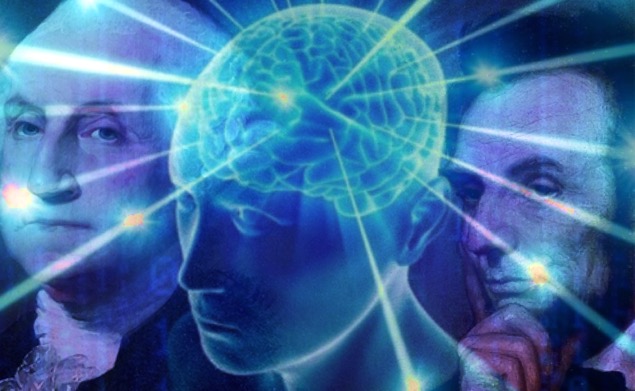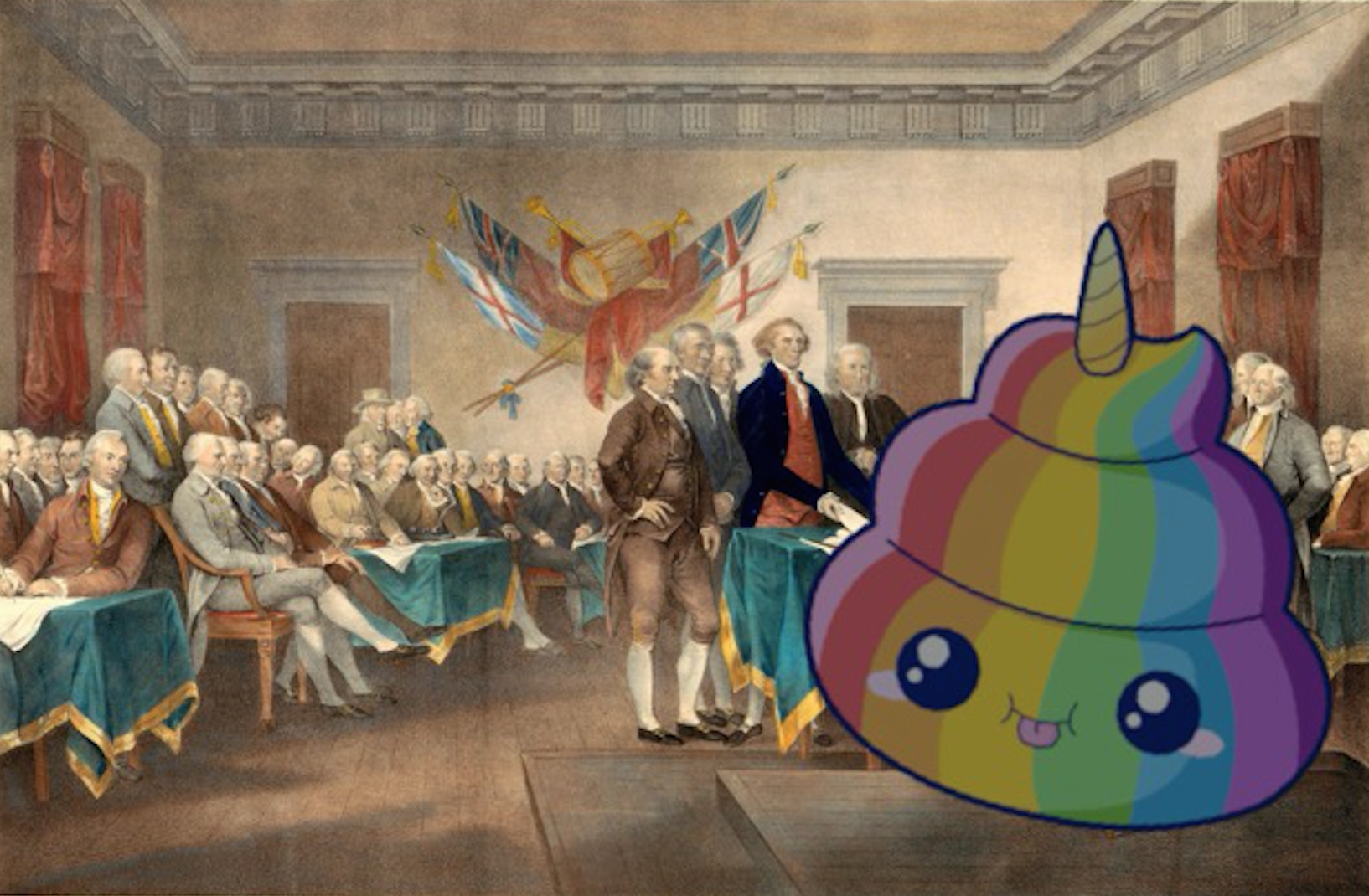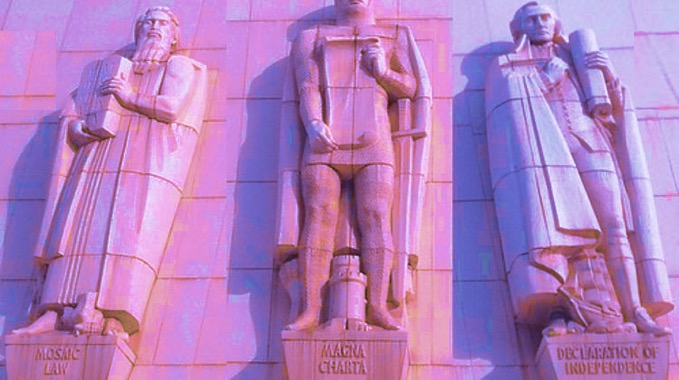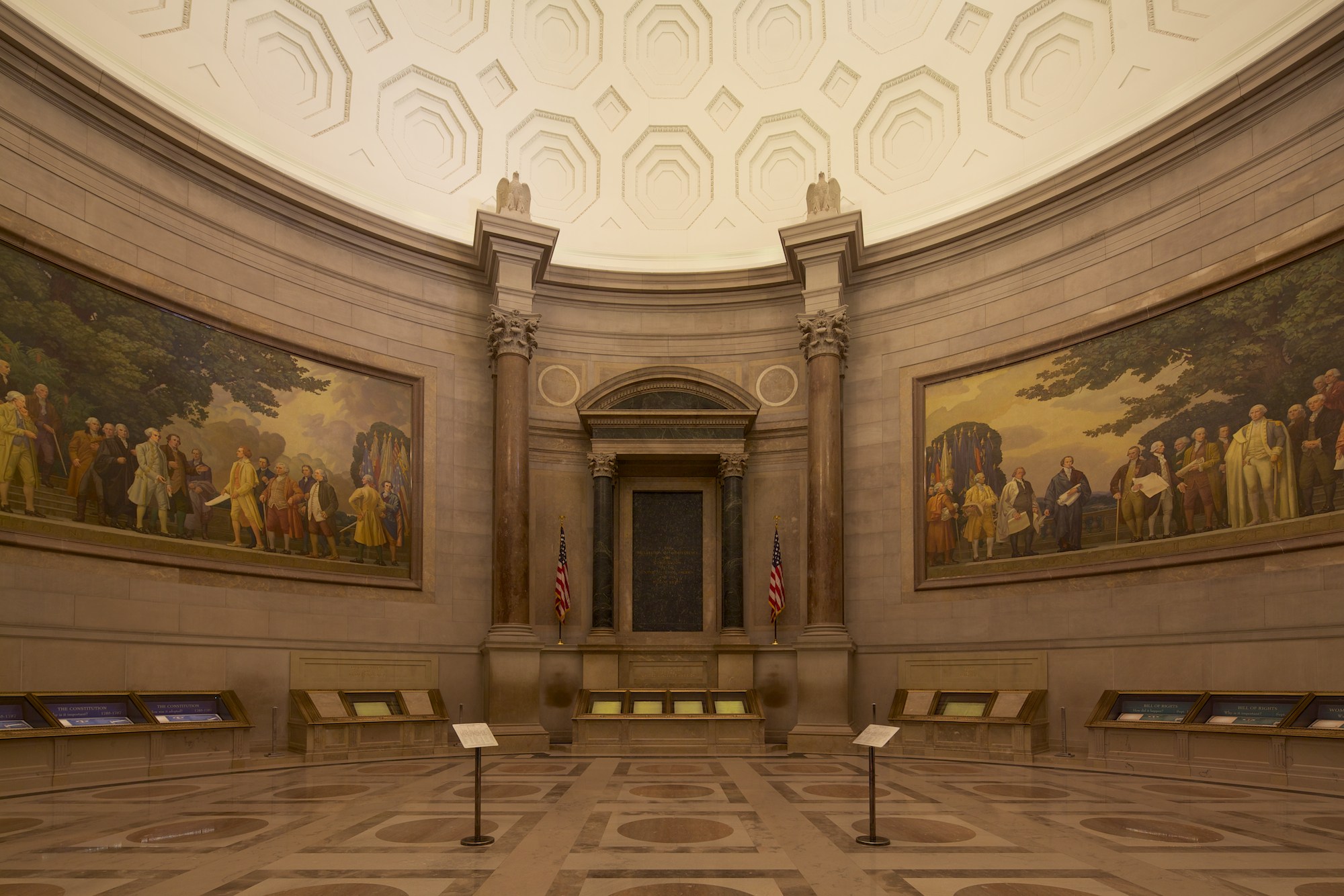Today's fights on the Right benefit old wisdom and new thinking alike.
Theorizing the Moral Foundations of Democracy

The American Founding was not based on “neutral principles.”
What should be the conservative, Christian, and Biblical response to the dislocations raised by an increasingly radicalizing liberal order? This has been the question in the background of much conservative thought—and public argument—for a very long time. The recent debate between David French and Sohrab Ahmari reveals the deep significance and practical political relevance of this question in our own time.
Conservative-minded political philosophers have been talking about the “crisis of liberalism,” “the crisis of modernity,” and “the crisis of the West” for at least three quarters of a century, if not longer. More broadly, myriad writers, thinkers, theorists, and statesmen have wondered about the fate of the human soul, its dignity and grandeur, in a political and social order that has tended to take the excellences of the soul for granted (think Tocqueville, Ortega y Gasset, Allan Bloom, or Pierre Manent). This question has come to the foreground in conservative Christian thought of late as “the culture of repudiation” (Roger Scruton’s indispensable phrase) has continued to ravage the moral foundations of democracy. In response to the regnant nihilism, some are tempted to jettison the American experiment in republican self-government altogether. Their analysis reduces American political thought to an amoral liberalism, a half-way house to relativism and moral rot.
The Politics of Moral Sense
As many have pointed out, this ungrateful condemnation of our entire political foundation does not, to say the least, do justice to America, or to our noble Founding. Unlike the more radical French revolutionaries, the American framers did not begin with “year zero” and did not self-consciously repudiate the moral and intellectual heritage of the Christian West. Some were deists, some were philosophically-minded theists, some were orthodox Christians, and one or two (Franklin? Jefferson?) may have been closet Epicureans and atheists. But all presupposed that a free political order depended upon the continuity of civilization and the ongoing cultivation of civic and moral virtue. They did not endorse moral relativism or ground a regime of liberty in “neutral principles” that were helpless to say anything whatsoever about what constitutes a good or decent society.
The Founders’ defense of a political order based on the “consent of the governed” was a signal contribution to the theory and practice of republican liberty. But, as Tocqueville already noted in 1835, the Founders did not anticipate the tendency of “choice” or “consent” to become the basis of almost every aspect of life. The first generations of Americans cherished the Christian and bourgeois family; we, in contrast, live with rampant divorce and what Christopher Lasch prophetically called “the culture of narcissism.” The Founders encouraged political and economic dynamism, a free society perpetually “on the move.” At the same time, they believed in an unchanging human nature, in the powers of human reason, and in a natural “moral sense” that together gave us access to real and enduring distinctions between truth and falsehood, good and evil, the noble and base.
The Founders had no doubts whatsoever that the God of the Bible, and “nature’s God,” too, had made human beings “male and female.” The idea of a radical distinction between sexual “identity” rooted in biology and a self-constituted “gender” rooted in feeling or choice would be abhorrent to them. In a word, the American Founders were not nihilists and did not genuflect before the altar of radical human “autonomy.” Men were not gods and did not make or create themselves, whatever John Locke may have subtly suggested between the lines in his Essay Concerning Human Understanding. Moral “constructivists” the Founders surely were not.
Theorizing Founding Principles, Rightly Understood
We do not need to jettison the Founding precisely because our Founding was never an invitation to moral anarchy or a badly concealed “political atheism,” to cite Orestes Brownson’s phrase from The American Republic, a deeply thoughtful conservative and Catholic defense of American republicanism published at the conclusion of the Civil War. In that great work, Brownson called on Americans to theorize and self-consciously affirm what the Founders had largely presupposed: an “unwritten constitution” rooted in the natural moral law, territorial democracy, and a recognition that the human will is always subordinate to a Higher Law that provides the true ground for opposition to anarchy and despotism alike. Unlike later totalitarians of the Left and Right, the architects of the American experiment knew that “autonomy” or “will” alone could never be the basis of civilized and ordered liberty.
As Richard Reinsch and the late Peter Augustine Lawler argue in their Brownson-inspired A Constitution in Full (just out from University Press of Kansas), the Founders paved a middle road between a theocratic-leaning Puritanism and a Lockeanism that was nominalist, and quickly reduced morality to a hedonic or utilitarian calculus. The Declaration of Independence defends “natural rights” and appeals to “nature’s God.” But the good theists of the continental Congress added references to God as “Judge” and to Divine Providence. And the peroration of the Declaration of Independence nobly appeals to sacrifice, to “sacred honor,” to a willingness to risk dying for freedom and one’s country. No unmanly preoccupation with self-preservation there.
Reinsch and Lawler follow Tocqueville, Brownson, and John Courtney Murray in a calling us to “theorize” a “constitution in full.” The Founders “built better than they knew”: cherishing the written constitution, let us, in response, “theorize” their considerable achievement as statesmen. Tocqueville reminded American democrats that public liberty in the form of active citizenship, “the art of association,” and local liberty, ennobled democracy and made citizens out of those tempted to succumb to materialism and atomistic individualism. Without challenging the good sense that underlies an institutional “separation of Church and State,” Tocqueville argued eloquently and persuasively that the coexistence and co-penetration of “the spirit of liberty” and “the spirit of religion” was the secret to America’s ability to avoid the degeneration of liberty into license and lawlessness. As a political philosopher, Tocqueville also believed Biblical religion taught Americans a profound philosophical and theological truth: Materialism reduced human beings to mere “brutes” and destroyed the metaphysical foundations of human liberty and human dignity. Religion wasn’t just “useful”: in some decisive senses it was true in pointing out that human beings were much more than “matter in motion.”
We can add to these wise and penetrating theorists of the moral foundations of democracy the testimony of the great Lincoln. No one did more to defend natural rights, and the right of the oppressed slave to receive what he had earned “by the sweat of his brow.” At the same time, Lincoln elevated American republicanism by reminding us all we have a duty to respect the humanity of our fellow men: self-interest, autonomy all by itself, could provide no compelling resistance to the desire to enslave others. In his glorious Second Inaugural, Lincoln combined natural rights republicanism with deference to the judgment of God: “malice to none, charity to all” could only lead to a “new birth of freedom” (to quote the earlier Gettysburg Address) if a free people repented for its participation in the monstrous crime and sin of chattel slavery. I see no “neutral principles” of the Rawlsian sort at work in the rhetoric and statesmanship of our greatest and most morally serious president, Abraham Lincoln.
Sohrab Ahmari is Mostly Right
How does all this relate to the contre-temps between Sohrab Ahmari and David French that is all the rage in the conservative journals and blogosphere (and on many left-liberal sites, too)? Ahmari is undoubtedly right about the quasi-totalitarian intentions of the antinomian Left. They want to discredit traditional morality—bourgeois and Christian—as antiquated, repressive, and incompatible with a truly “open society.” They will not, contra David French, respect the sincerity or “religious freedom” of those they see as irrational haters and theocrats. The partisans of what Ahmari calls “maximal autonomy” are not authentic liberals in the American republican tradition: they are activists and nihilists aiming to reeducate the young and to destroy the “common morality” shared by most Europeans and Americans for millennia or more.
Ahmari is right that the radical autonomy project is constructivist to the core and will tolerate no limits or exceptions. “Religious liberty absolutism” is indeed a secular form of dhimmitude, marking off religious believers and upholders of the old decencies and verities, as “extremists” who will be tolerated until the culture of repudiation reaches some new consensus about what is tolerably transgressive.
Ahmari is also incontestably right that a free and decent society need not tolerate drag queen readings for the vulnerable young at our public libraries. This is not a legitimate exercise of the right of association but part of an ongoing project to reeducate the young in the spirit of nihilism and permissive egalitarianism. “Liberty under God and the law,” as Tocqueville called it in 1856 in The Old Regime and the Revolution, gives way to nihilistic liberation and transgression, contemptuous of community standards and moral self-respect.
I do not see that Ahmari has succumbed to “integralism” as some have suggested. But he could have been more civil to David French who has been a stalwart social conservative and who has fought with great determination to defend religious liberty against the totalitarians on the Left. Ahmari’s identification of politics with enmity has a whiff of Carl Schmitt about it. In my view, tough-minded civility is perfectly compatible with Churchillian fortitude.
To both involved in this great debate, I again caution that American republicanism was never built (as David French suggests) on “neutral principles” and a flaccid pluralism. There is an enduring connection between religious and civil liberty, natural justice, and deference to a “Highest Good” which cannot and should not be embodied in theocratic political institutions. Between “neutral principles” and the “Highest Good” lies the intermediate territory where moral principles and political prudence find their home: in a morally serious citizenship and statesmanship informed by the deepest wisdom of classical and Christian civilization. Such prudence must inform liberalism and protect it from devolution into political correctness and a repudiation of all appeals to the true, the good, the decent, and the beautiful. This is David French’s weak spot: he rests content with a liberalism that is morally neutral and thus that has no political grounds for contesting cultural nihilism.
The search for the “truth about man” is the one thing most needful today. “Classical liberalism,” in its morally neutral form, is too spiritually empty to perform this task. As I argued in my 2011 book The Conservative Foundations of the Liberal Order, our calling in this age is to buttress the goods that give substance and moral and spiritual depth to a regime of liberty. Not autonomy understood as subjectivism, but a liberty that finds sustenance in patriotism, religion, noble statesmanship, family ties and bonds.
The great conservative-minded French liberal Raymond Aron, writing in 1978, who was not a religious believer although he respected the religious heritage of the West, cautioned the nihilists of his day that a free society still had to be a “good society.” Aron understood that civic virtue, moral decency, and martial courage add luster and nobility to the exercise of personal and political liberty. Aron added that a “hedonistic society,” where all desires have been liberated, is no society at all, and certainly not one worthy of human beings.
About this, all conservatives and classical liberals (rightly understood) ought to be able to agree.
The American Mind presents a range of perspectives. Views are writers’ own and do not necessarily represent those of The Claremont Institute.
The American Mind is a publication of the Claremont Institute, a non-profit 501(c)(3) organization, dedicated to restoring the principles of the American Founding to their rightful, preeminent authority in our national life. Interested in supporting our work? Gifts to the Claremont Institute are tax-deductible.
Moral and religious neutrality undermines the basis of American law.
The New Right renews Americanism.
A technological transformation is behind the rise of the New Right.
The New Right must reassert a vision of justice rooted in the common good.
The Ahmari-French debate is just the beginning.






